Gaming start-ups call for more government money
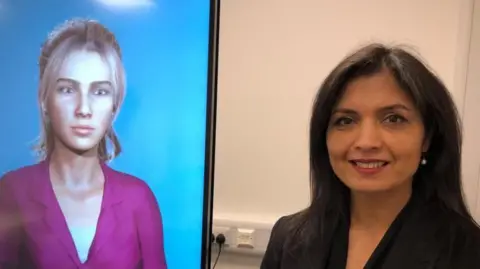 Vikki Irwin/BBC
Vikki Irwin/BBCMore government help is needed to fund start-up companies in the computer games industry, the head of a leading gaming firm has told BBC Politics East.
Asa Burrows, chief executive of SKC Games Studio in Suffolk, said there was "a lack of appetite to invest in the games industry" with private investments or government grants.
He said it was "impossible" to get the money in advance of a finished product, resorting instead to raising £1.5m through friends and family.
Sir Peter Bazalgette, co-chair of the Creative Industries Council, welcomed the government's investment of £40m set aside for start-up video games studios, film makers and creative industries outside of London.
Sir Peter, who also brought Big Brother to a global audience, added: "We need the private and public sector to invest hundreds of millions of pounds into our brilliant creative industries."
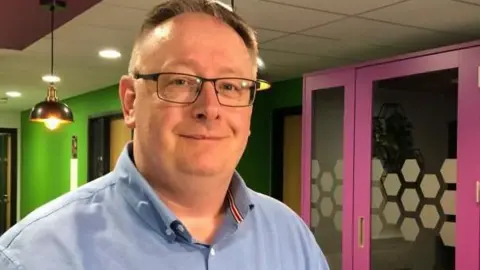 Vikki Irwin/BBC
Vikki Irwin/BBCIn 2023, the gaming industry in the UK was valued at £7.82bn and according to trade body uKie, employed 1,200 people in the East of England.
The majority of those are in Cambridge.
Babita Devi, commercial director at SKC Games Studio, said finding funding for the product was very difficult.
"It was very challenging trying to get the investment in the games studio," she said.
The firm, which is based in Haverhill and can take advantage of the centre of learning that is Cambridge University, has recently developed a new product using sophisticated human-like gaming characters.
They are designed in art studios and paired with artificial intelligence programming to create realistic avatars who can answer "any questions".
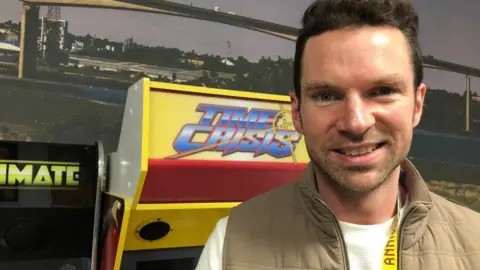 Vikki Irwin/BBC
Vikki Irwin/BBCBafta-winning gamer and founder of Sketchbook Games, Mark Backler, from Ipswich, Suffolk, said finding funding was difficult in the games industry.
"There are a lot of hoops to jump through and so many are applying for funding," he said.
Mr Backler, who also helped set up GameAnglia - which supports young people getting into the games industry in the region - said: "One of the great things about the gaming industry is it combines creativity with business - there's a range of opportunities: doing music, animation, game design, programming, accountancy and marketing."
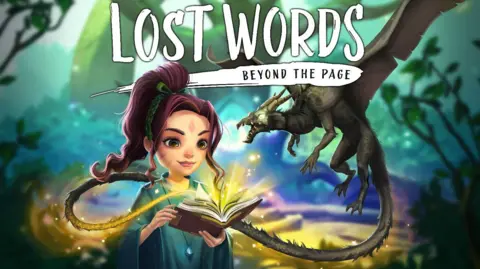 Sketchbook Games
Sketchbook GamesSir Peter, who created popular shows such as Ready Steady Cook, Changing Rooms and Ground Force, told BBC Politics East: "When I go into sixth forms, I ask: 'What's your favourite fashion? Movie? Game?'
"Then I say: 'What are the jobs in this industry?' and they haven't a clue. That's where we need to look in the mirror and say: 'We have not defined career path properly into the creative industries'."
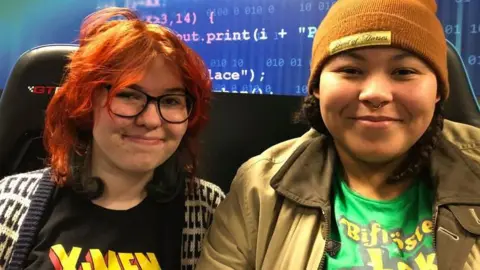 Vikki Irwin/BBC
Vikki Irwin/BBCThe growth of the industry is particularly important to Samara and Freddie, who are both Level 3 students at Suffolk New College in Ipswich.
They are studying games art and animation.
Samara, 19, from Colchester, said: "You're learning so much and it is not just about creating games, it is the art that we are also doing, so art comes into it and we can use different mediums, like any other artists."
Freddie, 17, from Sudbury, said he hoped there would be jobs out there when the course ended.
"You learn so many different things you can put anything into a game," Freddie said.
"So you are testing it all and when you go into the industry you can hone your craft."
A Department of Culture, Media and Sport spokesman said: "The creative industries, including video games, play an essential role in driving economic growth and spreading opportunity.
"We want to support talented new game developers to reach their full potential and create the next generation of hit games.
"That is why we are investing a further £5.5m into the UK Games Fund over the next year to support early-stage developers, and are backing the sector through our upcoming Creative Industries Sector Plan."
BBC Politics East will be broadcast on Sunday 26 January at 10:00 GMT on BBC One in the East of England, and will be available after broadcast on BBC iPlayer.
Follow Suffolk news on BBC Sounds, Facebook, Instagram and X.
